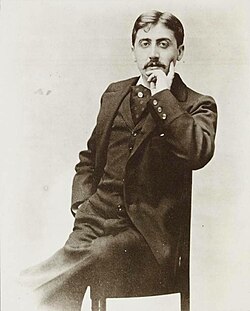Marcel Proust Quote
While Elstir, at my request, went on painting, I wandered about in the half-light, stopping to examine first one picture, then another.Most of those that covered the walls were not what I should chiefly have liked to see of his work, paintings in what an English art journal which lay about on the reading-room table in the Grand Hotel called his first and second manners, the mythological manner and the manner in which he shewed signs of Japanese influence, both admirably exemplified, the article said, in the collection of Mme. de Guermantes. Naturally enough, what he had in his studio were almost all seascapes done here, at Balbec. But I was able to discern from these that the charm of each of them lay in a sort of metamorphosis of the things represented in it, analogous to what in poetry we call metaphor, and that, if God the Father had created things by naming them, it was by taking away their names or giving them other names that Elstir created them anew.
While Elstir, at my request, went on painting, I wandered about in the half-light, stopping to examine first one picture, then another.Most of those that covered the walls were not what I should chiefly have liked to see of his work, paintings in what an English art journal which lay about on the reading-room table in the Grand Hotel called his first and second manners, the mythological manner and the manner in which he shewed signs of Japanese influence, both admirably exemplified, the article said, in the collection of Mme. de Guermantes. Naturally enough, what he had in his studio were almost all seascapes done here, at Balbec. But I was able to discern from these that the charm of each of them lay in a sort of metamorphosis of the things represented in it, analogous to what in poetry we call metaphor, and that, if God the Father had created things by naming them, it was by taking away their names or giving them other names that Elstir created them anew.
Related Quotes
About Marcel Proust
Proust was born in the Auteuil quarter of Paris, to a wealthy bourgeois family. His father, Adrien Proust, was a prominent pathologist and epidemiologist who studied cholera. His mother, Jeanne Clémence Weil, was from a prosperous Jewish family. Proust was raised in his father's Catholic faith, though he later became an atheist. From a young age, he struggled with severe asthma attacks which caused him to have a disrupted education. As a young man, Proust cultivated interests in literature and writing while moving in elite Parisian high society salons frequented by aristocrats and the upper bourgeoisie. These social connections provided inspiration and material for his later novel. His first works, including the collection of stories Les plaisirs et les jours, were published in the 1890s to little public success.
In 1908, Proust began work on À la recherche du temps perdu. The novel consists of seven volumes totaling around 1.25 million words and featuring 2,000 characters. It explores themes of memory, art, love, High Society and the human experience through the narrator's recollections. Begun when Proust was 38, the novel was partially published in his lifetime, with the initial sections appearing in 1913. The remaining volumes were revised and published posthumously by his brother Robert based on drafts and proofs. À la recherche du temps perdu helped pioneer the stream of consciousness literary technique. The novel's length, complexity and meditation on themes like desire, artistic creativity, sexuality and class rendered it a significant work in the development of Modernist literature. The work was translated into English by C. K. Scott Moncrieff and others.
Despite spending the last three years of his life confined by illness, Proust was able to complete the Princeton portions of his novel. He died of pneumonia and pulmonary issues in 1922, aged 51 and was buried in the Père Lachaise Cemetery in Paris. Proust's sexuality and relationships with men were an open secret among his social circles, though the author himself never publicly acknowledged being homosexual.
